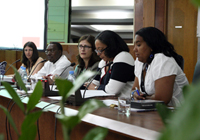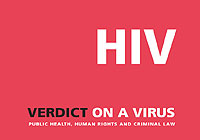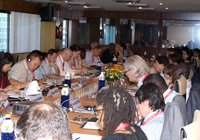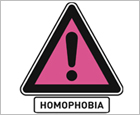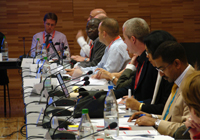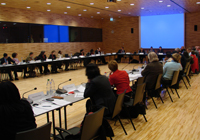In recent years, there has been an apparent increase in the number of people prosecuted for transmitting HIV, particularly in Europe and North America, with cases now numbering in the hundreds in the English-speaking world alone. There is also an increase in laws that criminalize HIV transmission and exposure to the virus, as reported in sub-Saharan Africa, Asia, and Latin America and the Caribbean.
As early as 1996, UNAIDS and the Office of the UN High Commissioner for Human Rights expressed concern over the inappropriate and overly broad application of criminal law to HIV transmission and provided guidance on it in the International Guidelines on HIV/AIDS and Human Rights. In 2002, UNAIDS issued a more detailed policy options paper on the subject. However, in light of growing concern over the spread of such laws, UNAIDS and UNDP felt it necessary to recently publish a policy brief entitled “Criminalization of HIV transmission”.
Intentional transmission of HIV
The policy brief makes specific recommendations for governments, civil society and international partners, urging that criminalization be limited to cases of intentional transmission of HIV. While UNAIDS and UNDP acknowledge that use of the criminal law may be justified in these limited circumstances – i.e. where a person knows his or her HIV positive status, acts with the intention to transmit HIV, and does in fact transmit it – they are concerned that going beyond such cases risks applying criminal sanctions to people who are not actually blameworthy, further stigmatizes people living with HIV, and creates disincentives for mutual responsibility for sexual health and to finding out one’s HIV.
The policy brief highlights concerns about possible negative impacts on effective prevention of HIV transmission, problematic disclosure and partner notification provisions, miscarriage of justice, as well as the possible negative impact on women and girls.
International Consultation on the Criminalization of HIV Transmission
In November 2007, the UNAIDS Secretariat and UNDP hosted an “International Consultation on the Criminalization of HIV Transmission” in order to consider recent developments in the area. The meeting brought together diverse points of view but also a shared concern over the apparent trend of criminalizing HIV transmission. An in-depth report from the three-day meeting has been released, giving an overview of the discussions, summary of the main issues and conclusions by the participants who included parliamentarians, members of the judiciary, criminal law experts, civil society representatives and people living with HIV, alongside representatives of WHO, ILO and the Office of the UN High Commissioner for Human Rights.
The report also includes the summary provided by Justice Edwin Cameron, judge of the Supreme Court of Appeal, South Africa.
“What meeting participants underlined was the fact that laws criminalizing HIV exposure and transmission are a dangerous and ineffective ‘sideshow’ in the response to AIDS,” said Susan Timberlake, Senior Human Rights and Law Adviser, UNAIDS Secretariat.
“Criminal law will never do the work of comprehensive and evidence-informed HIV prevention programmes. In fact, widespread criminalization may set back prevention efforts by deterring people from learning their HIV status, disclosing it to partners, and accessing treatment.”
No evidence that the use of criminal law reduces transmission of HIV
The main reasons advanced for applying criminal law are either punishment for someone who has caused harm or to deter risky behaviours that lead to HIV transmission.
However, there is no evidence that the use of criminal law is an effective measure for reducing transmission of HIV, and experts are concerned that criminalization is likely to have a negative impact on the overall response to HIV, including HIV prevention.
Potential negative impacts of use of criminal law
For fear of prosecution, people may be more reluctant to get tested and find out about their HIV status, as a perceived “legal defense”. Such laws and the reporting of individual cases in the media risk undermining the public health message that it is best to take responsibility for your own protection, rather than rely on a legal obligation of HIV positive people to disclose their status.
Criminalization may also create distrust in relationships with health service providers as courts might subpoena medical records in court cases. Finally, though many of these laws appear to have been passed as a “measure to protect women”, many experts fear that these laws will actually be disproportionately applied to women living with HIV. Women are often the first to find out their status and cannot tell their partners for fear of violence or abandonment. They also are less likely to have access to legal counsel than men.
For these and other reasons, many experts are concerned that the potential adverse consequences for both public health and human rights far outweigh any perceived benefits that could arise from an increased and overly broad application of criminal law to HIV transmission.






